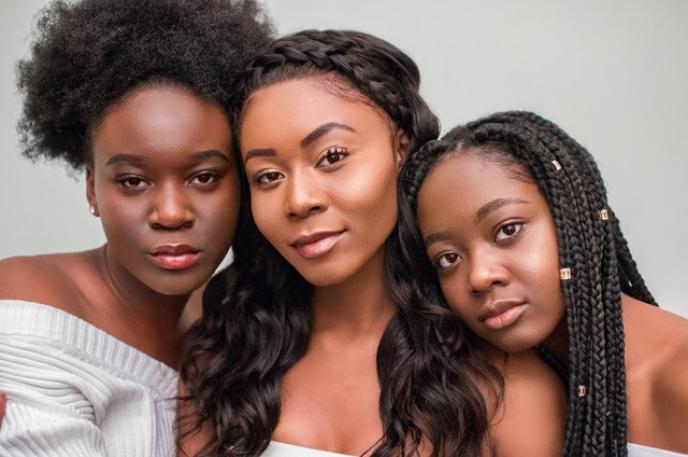
In celebration of Black (women’s) hair
March 9, 2021
This blog was written as part of Charlotte Mecklenburg Library's Black Lives Matter program initiative. Learn more about the program and corresponding events here.
What’s with all the hype about Black women’s hair? It’s the evolution of plastic barrettes and ballies and hot combs on stovetops, to sitting on the porch getting braids or spending an entire Saturday in the salon. It’s self-expression, a culture, and a commitment to defining oneself unapologetically.
In recent years there has been a societal shift in which many Black women have “returned to their roots” to embrace their natural hair. Hair that is not chemically straightened but rather curly, kinky, wavy, coiled, or locked. Depending on who you ask, the natural hair movement has been both championed and criticized but has also undoubtedly inspired a generation of bloggers, vloggers, influencers, and even a hashtag, #TeamNatural. Natural hair, though, hasn’t always been en vogue.
Finger waves, hair weaves, extensions, box braids, Jheri curls, roller sets, and relaxers are among the myriad ways Black women have coiffed their tresses throughout the decades. Often, society would deem more elaborate styles as less than professional. Natural hair is sometimes viewed as less kempt, a distraction, or simply less than.
In pre-colonial Africa, a person’s hair could tell her story, get it, “hair-story.” Hair could signify a person’s familial lineage, social status and marital status — it could even indicate mourning or fertility. During the Middle Passage, the hair of enslaved men, women, and children was shaved. This act was one of many that attempted to erase their culture and dehumanize them as well. When the hair grew back, it was often plaited or braided in rows. Cornrows could have intricate codes that helped guide the enslaved to freedom.
In Louisiana, in the 1700s, Tignon Law dictated that women of color wear scarves, kerchiefs, or other head coverings in public. Head coverings indicated that the wearer was a member of the slave class, yet the law was the same for the free and enslaved alike.
Black women’s hair is a big deal financially also. The first self-made female millionaire, Madam C.J. Walker, made her fortune through the production and sale of her own haircare line. Walker built a beauty empire that employed and educated thousands of Black women through her factory, hair salon, and beauty school.
Though the embracing of one’s natural hair is cause for celebration, Black women still find themselves at the center of criticism and controversy regarding their strands. Take, for example, the story of Chasity Jones, who, in 2010, had a job offer withdrawn after she refused to cut her locs. The Equal Employment Opportunity Commission (EEOC) filed a suit on Jones’s behalf in 2013 and lost. The 11th Circuit Court of Appeals upheld the ruling and dismissed the case in 2016. Then, Rhonda Lee was fired from her job as a meteorologist in 2012 after she responded to a comment on social media in which a viewer suggested she grow out her short afro or wear a wig to cover it while on air. Corallys Ortiz, another meteorologist in Jackson, Tennessee, also received negative commentary on her hair in 2018 when a viewer left a voicemail telling her to wear her hair “more normal” followed by a racial slur. Times are changing, though. Tashara Parker, another reporter, went viral after wearing a natural bun style on the air in Texas in 2020. She received lots of positive comments, along with a smattering of negative ones.
On September 21, 2020, the U.S. House of Representatives passed The CROWN Act. The CROWN Act, which stands for “Creating a Respectful and Open World for Natural Hair,” is a law that seeks to prohibit race-based hair discrimination, namely the denial of employment and educational opportunities because of hair texture or hairstyles, including braids, locs, twists, etc. The bill was originally introduced by U.S. Senator Cory Booker of New Jersey in 2019. At present, only seven states have passed it as law. In ten states, including North Carolina, The CROWN Act has been filed in one or more cities, but not statewide. The CROWN Act is law in Durham, NC, and Greensboro, NC.
To learn more about the about Black Hair, please view the booklist Women’s History Month: In Celebration of Black Women’s Hair.
--
This blog post was written by Alesha Lackey, children’s services manager at Allegra Westbrooks Regional Library.
